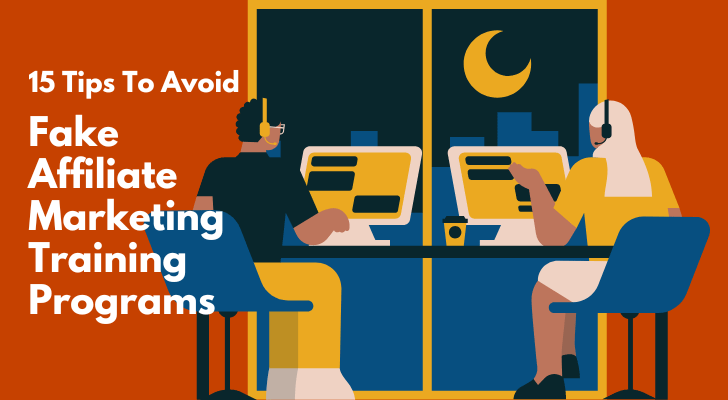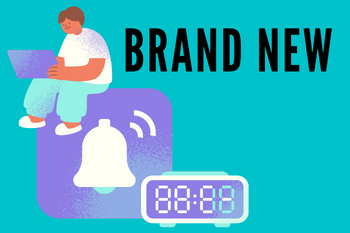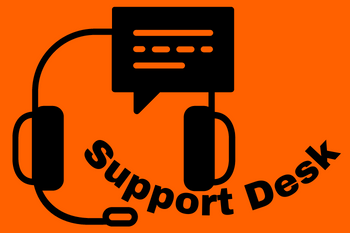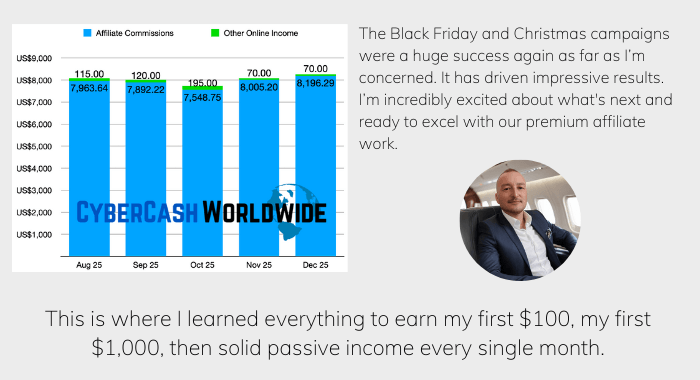Affiliate marketing has become an increasingly “popular” way to make money online, and with good reason: it’s relatively easy to get started, requires little upfront investment, and offers the potential for high rewards. But you should be aware of the fake affiliate marketing training programs out there- tons of them that may claim to offer real value, but in reality, they don’t deliver on their promises and can end up costing you both time and money.
So I’ll show you how to spot those fake or inferior training programs so you can avoid them entirely. I’ll also introduce you to some of the best practices for finding legitimate training programs that will give you the skills needed for long-term success.

Dangers of Fake Affiliate Marketing Programs
A legitimate affiliate marketing training program will teach you how to
- Find and promote products that are relevant to your audience.
- Build a website or YouTube channel that drives traffic and converts visitors into buyers.
- Send effective follow-up emails that convert leads into buyers.
Whereas fake affiliate marketing programs often promise unrealistic “easy and quick” wealth creation. This can lead you to spend a lot of money on the program, only to find out that it doesn’t work.
The information they initially provide you with is misleading, causing you to make poor decisions therefore also, ultimately, lose money. They also waste a lot of your time. You could use your time productively elsewhere instead of spending hours completing one of these programs, only to find out it was useless.
1. Be Wary Of Anything That’s Too Good To Be True
Be wary of anyone who claims to have a surefire system for success, because the truth is, there's no easy path to becoming a successful online marketer. I’m sure you agree that it takes a lot of dedication and experimentation to find what works for you and your future affiliate business.
While there are some general principles that all successful online marketers follow, there is no such thing as a "get rich quick" solution. Anyone who promises you overnight success with their marketing system is lying.
2. Google It First
When someone recommends you to join an affiliate training program, always google the name of the program and see if it’s legit or not. It doesn’t matter how that person sounds genuine, you should make your own judgement by checking what others say.
Here are the things to look for when you're doing your research:
Search By Name of the Program
Make sure the program is listed on the first SERP (search engine result page). This alone does not prove legitimacy, but at least you know that Google has not banned the website.
Read User Reviews
Read reviews from other people who have used the program. This can give you a good idea of what to expect and whether or not the program is worth your time and money.
Read through online reviews of the program before enrolling. Look for reviews from people who have actually completed the program and see what they thought about it. This can be a great way to get an unbiased opinion about whether or not a particular training program is right for you.
3. Reviews May Be Fake Too

By checking the reviews to see what others have said about the program, you’ll get a good idea of whether or not the program is legitimate and worth your time for sure.
However, there are a lot of “fake reviews” - either written by insiders or written by affiliates. There are so many affiliate marketers who tell you all the good things just to get you to pay. Here are a few things to look for in reviews:
- Make sure that the reviewer is an actual, real person and not just an affiliate with no face trying to promote the product.
- Look for detailed reviews that explain both the pros and cons of the program.
- Also look for negative reviews. Some fake reviewers deliberately criticize legitimate reviews just to recommend their own affiliate programs instead.
- Pay attention to how recent the reviews are. If they're all from a year ago or more, it's possible that the program has changed since then and may not be as good as it once was.
4. Beware of The Name Changes

When you google to find out about a particular tutor, you often see a description like this;
“So-and-so has 15 years of experience, and he/she has released numerous affiliate marketing training programs in the past, such as the ABC course, DEF method, and XYZ coaching series.”
This isn’t necessarily good.
If a tutor/owner keeps changing the name of their training program, I wouldn’t say the programs are “fake” but I would say;
Because from a student’s point of view, there’s no reason why there should be more than one affiliate marketing course by the same tutor.
They may add new materials as needed, or overhaul the entire program. But training courses are not like confectionery with lots of different flavors. The basics of affiliate marketing should never change so drastically.
All they’d have to do is update the version number (e.g. V2) while keeping the same course name for brand awareness purposes.
They come up with new names over and over again, as if there’s an undiscovered method every time. But that’s not the case. They probably do that to create a buzz, but by doing so, they’re confusing the students who have purchased the previous course and making them left behind. There shouldn’t be more than one affiliate marketing program owned by the same person, let alone so many.
5. Beware of Fake Accreditation Badges
It’s important to check a training program’s credentials, and one way is to see if the company is accredited by a reputable organization such as;
These accreditations can give you peace of mind that the company is reputable and has a good track record.
However - once again - it’s easy for anyone to create a fake badge. All they have to do is take a screenshot of a badge displayed on someone else’s site, place it on their homepage and pretend it’s theirs.
A real accreditation badge should be clickable and when you click it, you should be taken to the institution’s site that proves the accreditation. So don’t be fooled by the look of a badge. Make sure it’s real.
6. The Age of a Program
Check the affiliate training program’s domain history. You can copy the website URL and paste it on a free domain check site such as https://who.is. It will let you find out when the URL was first created instantly.
Find out how long the program has been around. Programs that have been around for a while are usually more reputable than brand-new ones. Brand new programs may have a false reputation; what appeared yesterday may disappear tomorrow, when it comes to online marketing services.
7. Don't Be Fooled By a Sob Story

You want to know who you're learning affiliate marketing techniques from, so tutors usually introduce themselves on the sales page. First of all, if there's no tutor/course creator's information, then forget it. The program is most definitely fake.
But what if the tutor's introduction is lengthy? Then you should be cautious, too.
The introduction aims to convince you to join the training program by proving how "real deal" they are. So they should be talking about their successful path short and on point.
If they keep going on and on about themselves, then they're not a good tutor. Probably the course content will also keep going on and on unnecessarily.
If they bring up a sob story (how they struggled in the past), that's just a marketing technique. It's a way to get you to know that they were once in the same position as you are now. You may be motivated by their story, but don't be fooled by it.
8. Consider the Price
Fake affiliate training programs either try to charge you an arm and a leg for something that isn't worth it, or a low price for something worthless.
Monthly Fees
A good rule of thumb is to never pay more than $100 per month for a training program. It’s not like a coaching program or a local seminar. You shouldn’t have to pay hundreds of dollars every month just to learn affiliate marketing techniques, which millions of others already have.
One-Off Fees Upfront
You should be warned if someone’s selling a training program for a one-off fee of $1,000 or over. They want to take all your money upfront for support that they’re supposed to provide over a period of time.
How fast you can learn depends on your availability as well as your capability. A young, quick learner who can spend all day and an elderly learner who works full-time has totally different capacities. They should be paying their fees as they learn, not everything in advance when there’s no guarantee of support in the future.
Low-Cost Products
They say “you get what you pay for”, but sometimes, low-cost products are less than what you pay for, in fact, worthless when it comes to affiliate marketing training.
If you see something that’s claimed to be a training program, but has a one-off charge of $10 - $50, it’s likely to be just a guidebook PDF or a collection of outdated training videos. They only tell you “what affiliate marketing is like”, instead of teaching you practical techniques.
Thousands of blog sites that tell you what affiliate marketing is like are out there for free already. So don’t waste your money on low-cost items that claim to be training.
Don’t spend too much money at once, but don’t spend too little on junk.
9. See If a Tutor Is Successful in Affiliate Marketing
When you encounter a training program, see if the tutor themselves is successful or not. They may be only teaching you theories of affiliate marketing because they’re not making enough money from it themselves.
If that’s the case, the method they know may already be outdated. It may not be fake affiliate marketing training, but it’s just no use learning from them. You want to follow the method that real successful people are using right now.
10. See If a Method Is Suitable For You
On the other hand, a tutor who claims to be a millionaire may be using a method that’s not suitable for you. It’s not fake training, but you may not be able to replicate the particular method that they use.
The tutor may be successful because, for example;
- They already have a huge network of people.
- They are good at hard-selling, sacrificing ordinary life (family, friends, relationships, etc.) for money.
- The method includes running seminars or conferences on a worldwide scale.
11. Avoid Hybrid Training Courses

Some marketing training courses are sold at a high price ($1,000 - $10,000 or over) and provide a huge volume of lesson modules and materials.
But it’s not the quantity. It’s not the quality, either.
Those courses may be great quality but expensive because they may cover multiple aspects of marketing, for example;
- Affiliate marketing
- eCommerce/drop-shipping
- Coaching service (i.e. teaches you how to become an online coach)
- Cryptocurrency investment, etc.
Basically, they’re selling you the whole lot and giving you the choice.
“Learn affiliate marketing. By the way, also learn drop-shipping if you want, because it’s great. Also invest in some cryptocurrencies, because it’s great too. Multiple-stream of income!”
You would get such multiple streams of income if you had more than one brain and a day was 72 hours long.
Don’t choose a hybrid training course. Just focus on one area - you want to learn affiliate marketing, so go for a training program that solely teaches affiliate marketing.
12. Trial Offer and Money-Back Guarantee

When it comes to a course program - never let a sales page alone convince you to buy. A legitimate program should offer a trial period so that you can try it out before committing to purchase. It should allow you to;
- Get comfortable with the structure of the program and its features, and
- Ensure that the program meets your expectations.
If it offers no trial period but a money-back guarantee instead, read the refund policy very carefully. It may be conditional, for example, you’ll only be eligible for a refund if you have opened 30% of the course module.
Take a screenshot of the guarantee policy before making a purchase, in case you are in trouble claiming your refund, you can use it to dispute against your credit card company.
13. Is The Trial a Real Trial?
This is a must - when you sign up and get free access to a trial module (or pay $1 for 3-day access, etc.) you must ask yourself if you're actually learning something from it.
I've seen a lot of "trials" that are not even tasters but merely an extension of the initial sales page. Throughout the trial module, all it says is;
"If you buy a full membership, you can do this, you can do that, and you can get these bonus materials!"
That's not training. If that's the case, the teacher is not a teacher but just a seller.
Make sure the free part is still teaching you something you can't find by googling. Not a general guide such as "what is affiliate marketing?" or "what kind of traffic is available?" You should be learning something practical and actionable. If you're not, then leave.
14. Find Out What Kind of Support is Offered

Here are some things to look for when you are trying to determine the level of support offered by a training program:
- Does the program offer live student support?
- Does it have a forum or community where you can get help from other members?
- Does it have a comprehensive FAQ/knowledge base section?
- Or email support only?
The more support options that are available, the more costly the program may become. But it’s always helpful to have someone to turn to when you are having trouble with something.
If what’s provided is only a support email address and there’s no support ticket system, it’s best to avoid it. There should be at least a secure messaging form to use.
Because even if the program is legit, if you're using an email application, your email may not reach their inbox safely but instead be sent to their spam folder.
15. Go With Your Gut
There's a full of hype and criticisms out there when it comes to affiliate marketing training programs. It can be hard to sift through everything and find the right one for you. But there's one thing you can always trust: your gut feeling. If something feels off about a program, it probably is.
When you're looking at programs, pay attention to your initial reaction. If something feels wrong, or like it's too good to be true, do some more research. See if other people have had bad experiences with the program. If there are red flags, trust your gut and move on.
There are plenty of great affiliate marketing training programs out there. If the program you didn’t choose turns out to be a great one, you probably didn’t miss much.
On the other hand, they say that failures are lessons to learn. If your gut feeling turns out to be wrong, that’s just a lesson. Your aim is not to waste time or money on scam affiliate training programs. But if you do, you’ll hopefully know what was wrong with your gut feeling, and how not to let the same mistake happen again.
So when in doubt, as well as doing your research, also make sure to listen to your heart.
Avoid Fake Affiliate Marketing Training Programs: Final Words
All in all, being extra vigilant when it comes to affiliate marketing training programs is an important step for anyone who wants to make sure they aren’t getting scammed by fake programs. By doing research on the program beforehand and keeping a lookout for any red flags that may be present, you can help ensure that your experiences with affiliate marketing are positive and profitable. With this knowledge at hand, you should now have no problem avoiding fake affiliate marketing training programs.



Thank you for the great post. I agree with you 100%. I Google everytime I see make money ads but people lie just to pocket money for them
I went with my gut many times and I was wrong.
If you cannot trust anybody?
Thanks for your comment, Dana. As I said in the article, beware of fake reviews and check the most critical ones, too. “Go with your gut” – what went wrong? If you’re still looking for training programs, I hope the combination of the above will help you find a suitable one for you. Feel free to contact me if you need help. Thanks!
Good points. The cost of training is the trickiest one. Free webinars a.k.a. sales pitch ?? You pay way too much at once when you are elated.
Hi, thanks for your comment. Yes, some “free webinars” are just sales videos, indeed!
THERE ARE SO MANY ALARMING FACTS YOU MUST KNOW about fake affiliate marketing systems.
They say you will be given a large sum of cash to begin a new lifestyle.
They say there will be a huge community to support you.
They say you will receive a monthly salary plus commission as you sell affiliate membership.
You will be protected with some kind of guarantees.
They say you will receive weekly support or webinar.
It’s suitable if you live in the east because of EST. They say you must be 18 years of age or over but the truth is they accept anybody without checking the ID as all they want is your money upfront.
THIS IS ALL BS. DO NOT EVEN THINK ABOUT IT.
Who said? Think about what? Chill, Joey.